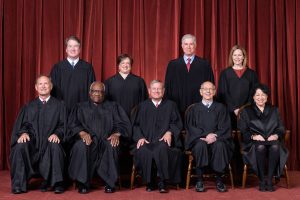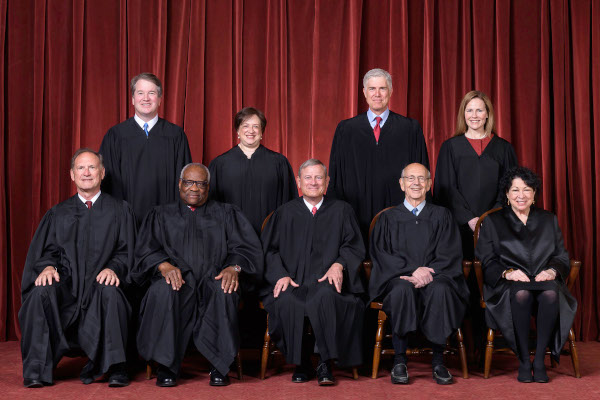 WASHINGTON — Oral arguments in Gonzalez v. Google were heard before the U.S. Supreme Court on Feb. 21 in a bid to decide whether the safe harbor provisions of Section 230 of the Communications Decency Act of 1996 would either be retained as is or entirely reinterpreted.
WASHINGTON — Oral arguments in Gonzalez v. Google were heard before the U.S. Supreme Court on Feb. 21 in a bid to decide whether the safe harbor provisions of Section 230 of the Communications Decency Act of 1996 would either be retained as is or entirely reinterpreted.
Section 230, often referred to by its proponents as the “First Amendment of the internet,” grants safe harbor for interactive computer platforms. The same safe harbor provisions also apply to adult entertainment websites, which rely on self-regulatory measures to protect against the actions of users who engage in potentially illicit behavior by publishing non-consensual content, including any child sexual abuse material.
During oral arguments, the nine justices expressed confusion about how the law protects tech and free speech on the internet. It became clear during arguments that the justices had grown increasingly concerned about the wider implications of potentially gutting the landmark law. Further, there was concern that any significant changes could cause a potential crash in the digital economy for online content creators.
“We’re a court,” said Justice Elena Kagan. “We really don’t know about these things. These are not the nine greatest experts on the internet.”
Justice Brett Kavanaugh, one of the six conservative members of the court of nine, agreed with Kagan, a liberal. Justice Kavanaugh asked in the arguments: “Isn’t it better…put the burden on Congress to change [Section 230]?” The Associated Press noted that he essentially was asking to keep things the way they are and let Congress, with the input of the direct and indirect stakeholders, through amending acts of legislation.
All the justices asked counsel for the plaintiffs and respondents to help them parse through the basic anatomy of a site’s recommendation algorithm. Chief Justice John Roberts simplified the understanding of recommendation algorithms as “pitching something in particular to the person who’s made the request.” Associated Press, adding context, indicates that Roberts remarked, just a “21st century version” of this.
Justice Clarence Thomas, a critic of Section 230, also asked whether YouTube uses algorithms to recommend rice pilaf recipes and terrorist content. “Yes,” counsel for Google was told. Kagan added that “every time anybody looks at anything on the internet, there is an algorithm involved.” This goes for adult websites, too. Algorithms, as inputs from third-party users, are consequently protected under Section 230.
Justice Ketanji Brown Jackson, President Joe Biden’s recent appointee to the high court, stood squarely in the corner of the Gonzalez family. She said that Section 230 was simply enacted to encourage companies to remove “offensive content.” Recommendation algorithms were “not something the statute was directed to.” Justice Jackson believes that Google’s interpretation of Section 230 “seems to bear no relationship to the text of the statute.” The result Google wants, Jackson argues, would be to leave in place the law that she argues encourages web platforms to deliberately amplify inflammatory content on the web. In POLITICO’s coverage, Justice Jackson is called the court’s “most liberal” justice.
“What the people who were crafting this statute were worried about was filth on the internet,” said Jackson, replacing Clarence Thomas, a staunch conservative, as the high court’s most vocal critic of the technology industry’s broad-ranging liability shield under Section 230. “That seems to me to be a very narrow scope of immunity that doesn’t cover whether you were making recommendations or promoting it. … How is that even conceptually consistent with what it looks as though this statute was about?”
Luckily, the majority of the justices expressed no aggressive interest in completely gutting Section 230 because of the potential large-scale economic implications on tech and the internet.
Several liberal and conservative justices suggested that Congress is the appropriate venue to amend Section 230, not the high court. Justice Kagan, again, alluded to lawmakers taking a “scalpel” to the law. Lisa Blatt, representing Google, told the court that recommendations are a way of organizing information in an accessible manner for users.
YouTube users collectively watch over a billion hours of videos daily and upload more than 500 hours of videos every minute. Roberts was among other justices who questioned whether the YouTube business unit compared to legal protections for search engines. Justice Roberts said: “They appear pursuant to the algorithms that your clients have. And those algorithms must be targeted to something. And that targeting, I think, is fairly called a recommendation, and that is Google’s.”
“This is about diversity of viewpoints, jumpstarting an industry having information flourishing on the internet and free speech,” Blatt said.
Federal courts at lower levels of government have broadly interpreted Section 230 to protect the technology industry. Technology companies, including firms that own the largest social media networks, have enjoyed this broad protection contributing to the meteoric rise of the internet and the digital economy. The law’s safe harbor provisions also protect internet platforms and their owners from suits over posts by third-party users.
Advocates for Section 230 also argue that the courts have collectively affirmed the law to be in accordance with the First Amendment and the right to free expression on the internet. Such an assessment protects much of the content on the internet and the evolution of the medium itself.
“I did not hear 5 votes in favor of the plaintiffs’ position,” wrote Eric Goldman, associate dean for research and a law professor at Santa Clara University School of Law, on his blog . “Indeed, the justices didn’t really engage with the plaintiffs’ core arguments much after their initial dismantling, which I take as a sign of their lack of persuasiveness. For that reason, I have a little optimism that Google will win the votes–much more so than yesterday.”
At issue are the limits to the liability shield for internet companies. The Supreme Court has never fully addressed the scope of the liability. Some maintain that Section 230 immunity sweeps too broadly. This is the central point of concern in Gonzalez v. Google. YNOT.com has previously reported on Gonzalez. The family of Nohemi Gonzalez brought the legal challenge claiming that Google-owned YouTube is in part liable for her death. An American college student who was on foreign exchange in France, Nohemi Gonzalez was killed in 2015 during the Paris terror attacks carried out by the terror group Islamic State.
Algorithms, counsel for the Gonzalez family argue, serve as functions of publication making platforms like YouTube liable. In Google’s view, however, the algorithms used to recommend videos depicting Islamic State propaganda and other terrorist content (or rice pilaf recipes) maintain similar basic functions and rarely are designed with overt bias. The algorithms simply recommend to users content that is based on browsing history and viewing history across YouTube and Google’s search ecosystem. Unfortunately, some individuals just fell into radicalization and consumed terrorist-related content. As Goldman has previously argued, this shouldn’t constitute liability for Google under the law.
Supreme Court Justices portrait by Fred Schilling, from the Collection of the Supreme Court of the United States












